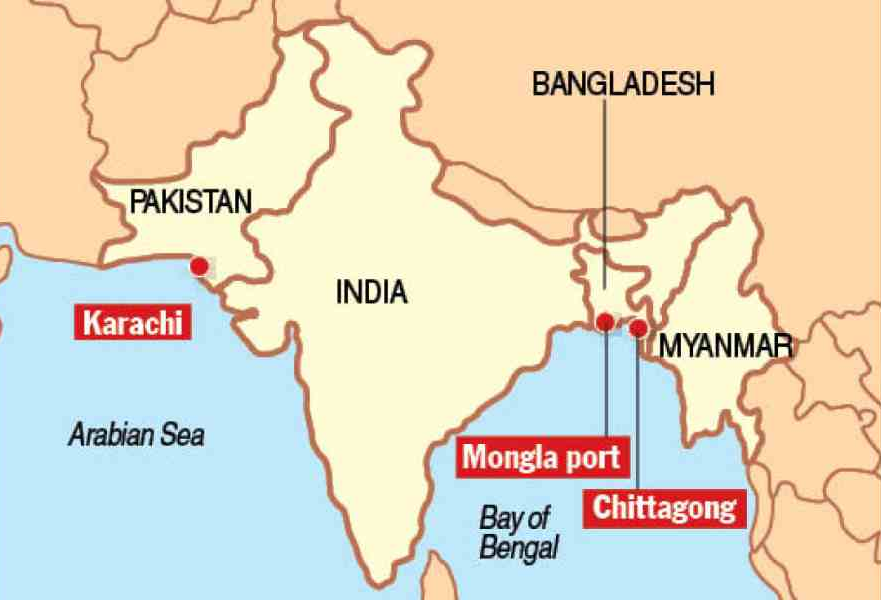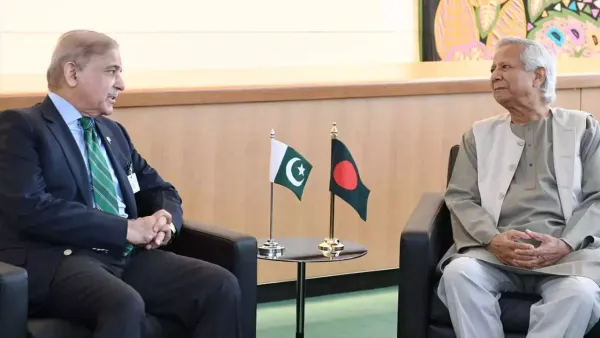Table of contents
The arrival of a Pakistani cargo ship in Bangladesh's Chattogram port on November 13, 2024, is laden with symbolism and political significance, marking a potential shift in the historically strained relationship between the two countries.
Historical Context
For decades, the bilateral ties have been overshadowed by the violent events of the 1971 Liberation War, which led to Bangladesh's independence and left an indelible scar on its national psyche.
- 1971 Liberation War:
- A nine-month conflict where Pakistan's military committed widespread atrocities in Bangladesh.
- Atrocities: ~3 million killed, thousands tortured/raped, millions displaced.
- Pakistan has never apologized for the genocide, hindering reconciliation.
- Pakistan frames the war as an "Indian conspiracy" rather than an internal oppression issue.


The geopolitical undercurrents surrounding this event, including Sheikh Hasina's departure from power, domestic shifts in Bangladeshi sentiments, and strategic calculations by Islamabad, all contribute to this moment's importance.
Lingering Grievances
The shadow of the 1971 Liberation War, during which the Pakistani military committed atrocities against Bangladeshis, has long defined the relationship. Pakistan's refusal to apologize for these events has made reconciliation challenging.
- Sheikh Hasina's Policies:
- Advocated for justice for 1971 war crimes.
- Prosecution of collaborators via the International Crimes Tribunal (est. 2010).
- Banned Jamaat-e-Islami, a pro-Pakistan Islamist party.
- Strengthened Bangladesh-India ties during her tenure.
Sheikh Hasina's tenure, characterized by her relentless pursuit of justice for 1971 war crimes and a pro-India stance, further entrenched these divisions. Her government’s actions, including prosecuting and executing pro-Pakistan collaborators, maintained a hardened stance against Islamabad.

Changing Dynamics After Hasina’s Ouster
The departure of Sheikh Hasina in August 2024 signalled a turning point in Bangladesh's domestic and foreign policy orientation. Three key factors illustrate this shift:
- Generational Disconnect with 1971: Younger Bangladeshis, who did not experience the war firsthand, prioritize present-day economic and social concerns over historical grievances. This generational shift reduces the emotive weight of 1971 in shaping national policy.
- Resentment Toward India: Hasina's perceived closeness to India sparked criticism among those who viewed it as compromising Bangladesh's sovereignty. Recent anti-India sentiment, as demonstrated by attacks on Indian cultural centers, reflects growing dissatisfaction with New Delhi's influence.
- Islamist Narrative and Jamaat-e-Islami’s Role: The resurgence of the Islamist narrative, which frames 1971 as a tragedy of the Muslim nation rather than a nationalist triumph, aligns with the interests of groups like Jamaat-e-Islami. Their strengthened position in post-Hasina Bangladesh creates space for reevaluating ties with Pakistan.
Strategic Calculations by Pakistan
For Pakistan, the current environment presents an opportunity to rebuild relations with Bangladesh. Islamabad is leveraging the departure of a staunchly anti-Pakistan leader and growing anti-India sentiments in Dhaka to extend a conciliatory hand. This outreach aligns with broader regional dynamics, where Pakistan seeks to recalibrate its relationships amid economic and political challenges.
Symbolic Cargo Ship:
- Direct maritime contact between Karachi and Chattogram signals the potential for renewed ties.
- Highlighted as a step forward in bilateral trade and diplomacy.
Changing Dynamics:
- Pakistan sees Hasina's departure as an opportunity to rebuild relations.
- Advocacy for a "reset" by Pakistani op-eds and diplomats.
Diplomatic Initiatives:
- Pakistani Prime Minister Shehbaz Sharif and Bangladeshi Interim Chief Advisor Muhammad Yunus met in New York to discuss enhanced cooperation.
- Positive reception from Bangladesh's interim government.

The docking of the Karachi-Chattogram cargo ship is a tangible expression of this strategy, representing a direct economic link that bypasses decades of diplomatic frostiness. Such gestures could pave the way for broader economic cooperation, people-to-people exchanges, and even political dialogue.
Implications for the Subcontinent
This warming of ties between Pakistan and Bangladesh could have profound implications for South Asia's geopolitical landscape:
- Potential Realignments: India’s Influence at Risk
- Closer Pakistan-Bangladesh ties could challenge India’s influence in Dhaka.
- Economic and cultural exchanges may grow between them, altering regional trade dynamics.
- Islamist Influence:
- The resurgence of Islamist narratives in Bangladesh and their potential alignment with Pakistan's policies could alter regional security dynamics.
- The strengthening of Jamaat-e-Islami and similar groups might shift Bangladesh's ideological landscape.
- Diplomatic and Economic Opportunities:
- The maritime connection could pave the way for stronger economic ties and strategic alliances between them.
- This may also challenge India's role as the primary economic partner for Bangladesh.
A Tentative Reset
While the symbolism of a cargo ship is significant, it remains to be seen whether this moment will translate into sustained change. Deep-seated mistrust, unresolved historical grievances, and the volatile nature of interim governments may yet hinder long-term progress.
However, the event undeniably marks a critical juncture in subcontinental history, offering both countries a chance to redefine their relationship in a rapidly changing world.

Write UnLimited Course (1 Year)
Write answers from any source, we will evaluate them for you.
